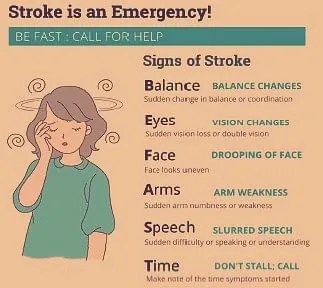Stroke is a catastrophe, leaving the victim disabled often for life and becoming a burden on the family and the society. The acute management is difficult.
The victim needs to reach a centre within an hour, have a CT head done to rule out a bleed within the brain, which is often present in the reports from the valley hospitals. This makes administration of a clot buster medication not a choice, in fear of extending the stroke by further bleeding.
Prevention therefore is the key. Most strokes occur in the elderly except those associated with some heart valve problems or birth defects. The four most important causes of stroke to be looked for and treated properly are;
High Blood Pressure:
A problem highly prevalent in up to 1/3rd of our senior citizens and in even those it is being treated; treatment is often not at goals. The BP should be close to 130/80 mms Hg.
Appropriate drugs in adequate doses under supervision need to be taken. Associate kidney problems by a urine test for protein and serum creatinine needs to be done periodically, at least yearly and if abnormal it should be brought to the notice of the treating physician.
Cigarette Smoking:
Lot of our elderly are chronic smokers especially in rural areas. It is a very important risk factor in the causation of stroke especially in persons who already have risk factors like hypertension and a family history of stroke. It has been shown that quitting smoking reduces the stroke risk substantially. In several patients with stroke, smoking is the only identifiable risk factor. It is never too late to stop smoking.
Diabetes:
Once again, a highly prevalent problem needing early recognition. If present, it needs treatment by life style modification (keeping weight in check. Also, heart healthy diet of plenty of fruits and vegetables, salads etc. Medicines in proper doses and physicians should use newer drugs like (dapagliflozin/ empagliflozin) liberally.
The improve the outcomes. In those with previous vascular events like strokes or heart attacks agents like injectable, Liraglutide, dulaglutide and semaglutide need to be given. Semaglutide is now available as an oral agent also (Rybelsus).
Atrial Fibrillation (AF)
AF is an abnormality of heart beat which increases the risk of stroke by at least 5 times. Its incidence in elderly population is at least 10%. As age advances its chance increases substantially. The hallmark of this arrhythmia is rapid and irregular heart beat and pulse.
It can come as episodes with intervening periods being normal. Persons with irregular pulse need to get an ECG done and this is the simplest method of recording. If the palpitations occur intermittently a prolonged ECG monitoring by Holter method is useful.
This rhythm can lead to clot formation in the heart and its dislodgement and lodgement in a brain artery is a common cause of stroke. Contrary to a popular belief aspirin has no benefit in this condition. It needs anticoagulants.
There are a number of them with fixed doses available (Dabigatran, apixaban and rivaroxaban) with very low chances of bleeding. These patients should be on one of these agents under medical supervision especially if they have concomitant risk factors.
Look for these 4 causes, and if you have any of them become vigilant and get treated. Remember an ounce of prevention is worth a pound of cure. (Benjamin franklin, 1736)
Prof Upendra Kaul, Founder Director Gauri Kaul Foundation
Disclaimer: The views and opinions expressed in this article are the personal opinions of the author.
The facts, analysis, assumptions and perspective appearing in the article do not reflect the views of GK







